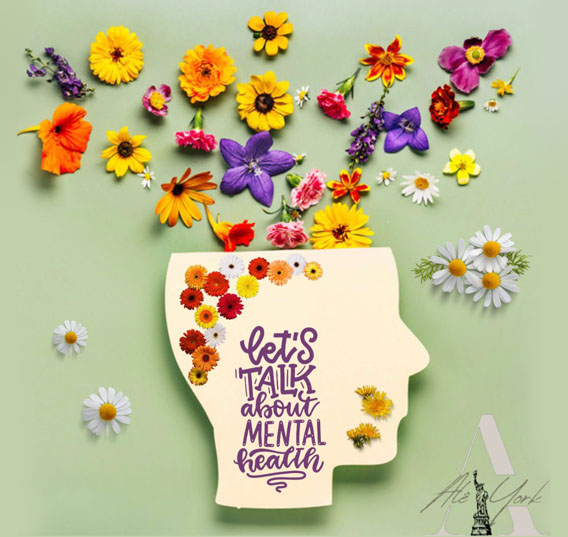
Mental Health Awareness
The month of May is considered Mental Health Awareness Month in the USA and I would like to emphasize that awareness is important not only in the USA, but in any part of the world.
There are many things we can do to raise mental health awareness around us not only in May, but incorporate it into our daily lives.
You will find practical and free resources on how to support your mental health and the health of the people around you on Alê York’s website. It offers you helpful suggestions and ways to adapt your environment to improve your overall well-being and health. With these resources you have the possibility to develop ways to deal with difficult situations even when change seems out of reach.
I know that many people would like to improve their mental health but they don't know where to start. Just thinking about it raises anxiety.
BREATHE DEEPLY
Read the tips as many times as necessary.
Start putting into practice the tips that you consider most appropriate to your reality.
You are able to improve your mental health and spread awareness about it with the people around you!
HOW TO RAISE MENTAL HEALTH AWARENESS?
We know that mental health can still be considered a taboo in some contexts or cultures around the world and that is why awareness is important.
One of the reasons why mental health is considered taboo may be a lack of understanding or knowledge about mental health conditions and available treatments. Stigma and discrimination around mental health can also play a role and can prevent people from speaking openly about their experiences or seeking help when they need it. For many years, mental health conditions were seen as a sign of weakness or moral failure, which reinforced stigma and made it difficult for people to speak openly about their struggles.
Fortunately, through technology and access to information there has been greater recognition of the importance of mental health in recent years, efforts have been made to reduce stigma and increase access to mental health care.
Several factors can influence our mental health and well-being. Some aspects of our environments may be beyond our immediate control, while in other areas we have the potential to make change.
- Childhood experiences
Trauma and other negative experiences during childhood can increase the risk of developing mental health disorders later in life.
- Stress
High levels of stress can have negative effects on our mental health, leading to anxiety, depression and other disorders.
- Traumatic events
Exposure to traumatic events such as abuse, the death of a special person or accidents can also have a significant impact on our mental health.
- Social isolation
A lack of support and social interaction can also affect our mental well-being, leading to feelings of loneliness and isolation.
- Health conditions
Certain physical health conditions such as pain, chronic and serious illnesses can also have a significant impact on mental health.
- Substance abuse
Substance abuse and dependence can have harmful effects on mental health, leading to depression, anxiety and other disorders.
- Genetics
Certain genetic predispositions can increase your risk of developing mental health problems.
- Sleep
Lack of sufficient sleep can also negatively affect mental health, leading to irritability, mood swings and difficulty concentrating.
Which of these factors do you think influence your mental health?
Reflect and honestly answer what you think is negatively influencing your mental health. Look around you, as the environment we live in also affects our mental health and well-being.
You can make your environment healthier and improve your mental well-being. See some tips below:
1. Educate Yourself
We should all learn about mental health and mental illness. This includes understanding the warning signs, symptoms and the importance of seeking professional help.
So read more, look for podcasts on the subject, watch videos on the subject, and so on.
2. Talk about mental health
Encourage open communication about mental health and mental illness. This will help reduce the stigma around mental health and encourage those who need help to seek it out.
3. Seek help
If you or someone you know is struggling with mental health, please encourage them to seek help. This can be done through seeing a mental health professional, a support group, or even talking to a trusted friend or family member.
4. Practice self-care
It's important to take care of yourself mentally and physically. This includes getting enough sleep, eating a healthy diet, exercising regularly, and practicing stress reduction techniques.
5. Practice gratitude
Start giving thanks for the little things in your life. We have much more to be grateful for than complain.
In addition to spreading awareness about mental health among adults, it's important to start talking about it with kids too.
Start helping the kids and teens around you today with some tips on how to teach mental health in everyday life:
1. Normalize the conversation about feelings
Make this taboo a regular part of your conversations with your children or children around you and encourage them to express themselves. Let them know that it's okay to feel sad, angry, or anxious at times.
2. Teach exemplary healthy coping tools
Children learn a lot by watching their parents and caregivers. Show them healthy ways to deal with stress, like meditation, exercise, or talking to others.
3. Encourage mindfulness
Encourage children to focus on the present moment and be aware of their thoughts and feelings. This can help them build resilience and deal with stress.
4. Promote self-care
Teach children to take care of themselves both physically and mentally. This includes getting enough sleep, eating healthy, and engaging in activities that bring you joy.
5. Talk about mental health positively
Avoid using negative or stigmatizing language when talking about mental health. Instead, focus on their importance and emphasize that reaching out for help when needed is a sign of strength.
6. Treat mental and physical health equally
Reinforce the idea that mental health is just as important as physical health and ensure your children receive the support and care they need for both
These were some tips for raising awareness about mental health.
REMINDER
When someone makes a joke about your mental health or someone you know, your duty is to educate that person so that they learn and also become aware of the importance of mental health in our lives.
It is crucial not to judge others when it comes to mental health awareness. Mental health affects everyone, regardless of background or circumstances. Judging someone for their struggles with mental health only adds to the stigma around mental illness and makes it harder to seek help.
Rather than being judgmental, individuals should focus on educating and teaching others about the importance of mental health awareness. This will help reduce stigma and encourage others to seek the help they need. Everyone deserves to be treated with respect and compassion, especially when it comes to their mental health.
I hope these tips help you! There are more free resources on the website.
Please download the free E-book.

Please share this information with people you love and help them to become aware of it.


